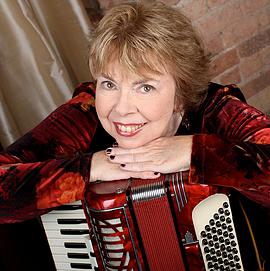Heelan brings the dance halls back to life
UNION – The McHenry County Historical Society kicks off its annual Sampler Series Monday, March 16, with a topic that is sure to get your toes tapping.
Musician and history buff Mary Ellen Heelan, of Cary, will present “We Sang! We Danced! A Musical History of McHenry County” at 3 p.m. at the McHenry County Historical Society Museum, 6422 Main St., in Union.
“This is an overview: Where people went, the kind of music they listened to, and what was going on culturally,” Heelan said. “If there was one thing that got my attention it was probably the dance halls. I was fascinated by how many [caught fire]. You look at these places and it is kind of like ghosts rising from the embers. I’m helping to bring it back to life.”
In addition to being president of music entertainment business, Heelan is a board-certified music therapist with a degree from DePaul University. She earned a bachelor’s degree in history from Saint Xavier University in Chicago and an MBA from the Kellogg School of Management, Northwestern University. Needless to say, she has an inquisitive mind.
“When I started out I had little bits and pieces. But I wanted to know what the sounds were; actually hear the music,” Heelan said. “Music is universal and it’s part of everyone’s experience. If you understand the music people made, you understand the people themselves.”
Heelan did track down some original music from Bob Freund’s Orchestra and some original sheet music.
“You can tell a great deal about the times from lyrics of songs,” she said. “You can tell what is politically correct and what isn’t.”
Heelan noted that “I Left My Sugar Standing in the Rain (My Sugar Melted Away),” for example, reinforces the stereotype that it takes a Chinaman to properly clean and press a shirt.
By and large, musicians were local. Most of them had day jobs and many have either died or are in poor health. Despite this, Heelan has been fortunate enough to interview some band members who still are here.
“The Botts Moonlight Serenaders from Woodstock, the Red Devils and Eddie Peabody. You are not going to get these guys re-mastered on YouTube videos,” she said. But Heelan can, and does, pay homage to their music in song – by singing and playing the piano and accordion.
A Downers Grove native, Heelan moved to McHenry County 10 years ago by way of Oklahoma. She credits that detachment and an insatiable curiosity for being able to approach the now three-year detective story with a fresh eye. Along the way she learned the largest dance hall in the county in the early 1900s was Pabst Hall, located in the Strode’s Furniture building at 11707 E. Main St. in Huntley, and that even the smallest town’s boasted opera houses – some, like Marengo, linked by special trains to Chicago.
“Everywhere I go I ask: ‘Where did people dance?’” Heelan said. “I’d like to be the catalyst, in a tiny way, for bringing parts of the community together to preserve local history.”
The four-part series continues every other week through April. Upcoming Samplers are:
• 7 p.m. Monday, March 30 – “Domestic Servants in the 19th Century.” Speaker Erika Hoist, curator of the Edwards Place historical home in Springfield, talks about domestic servants and their role in the 1800s when “hired girls” were common in middle-class households across Illinois. Learn about these immigrants, their duties and how their responsibilities evolved over time. Handle period artifacts such as mixing bowls and a flat iron.
• 7 p.m. Tuesday, April 14 – “Man Who Knew Lincoln” – The Historical Society is partnering with the McHenry County Civil War Roundtable to bring Abraham Lincoln’s law partner, William Herndon, to the McHenry County Historical Society museum. After his friend’s death,
Herndon (portrayed by Ron Halversen of the Kenosha Civil War Museum), undertook the enormous task of writing Lincoln’s biography. The performance portrays Herndon after he conducted all his research on Lincoln. Much of the information he gathered came courtesy of Lincoln’s friends and family. Herndon discovered Lincoln’s earliest speeches, about navigating rivers, and an account of young Lincoln’s distain for slavery.
After stumbling into a slave market during a boat trip to New Orleans, Lincoln vowed to abolish the practice should he ever get the chance.
• 3 p.m. Tuesday, April 28 – “The Journey to Mollie’s War: WACs and World War II.” Speaker Cyndee Schaffer’s discusses the often overlooked impact of the Women’s Army Corps (WAC) during World War II. It traces the footsteps of the women who served in Europe, following her and her fellow WACs who were stationed in London, England, before D-Day and during the post-D-Day German buzz bomb attacks. WACs were the first women other than nurses to serve overseas in World War II.
All programs are at the Society museum, 6422 Main St. in Union. Series tickets are $35, $30 for Society members. A $10 donation is requested for individual programs. The servants and WAC programs are made possible through a grant from the Illinois Humanities Council. For information, call (815) 923-2267.



